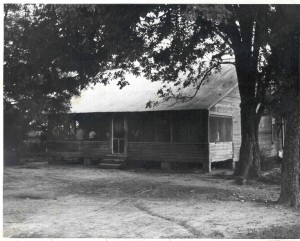Page 11 – 20
The WITNESSES
Simeon Wright
(Cousin) – Witness to Abduction
[https://www.nytimes.com/2017/09/06/obituaries/simeon-wright-witness-to-abduction-of-emmett-till-dies-at-74.html]
Moses Wright
(Uncle) Testimony in the trial
Willie Louis
Witness to the murder
On another note, an eyewitness, Willie Reed testified at trial that he saw four whites and three Blacks riding in the truck that entered the Milam property and presumably carried Emmett Till. Reed also testified that he later heard whipping and hollering sounds coming from the barn. After the trial, several men – including both Whites and Blacks – admitted to friends or relatives that they were with Milam and Bryant on the night Till was kidnapped and murdered. None have been prosecuted.

Despite fearing for his life, key witness Reverend Wright testifies
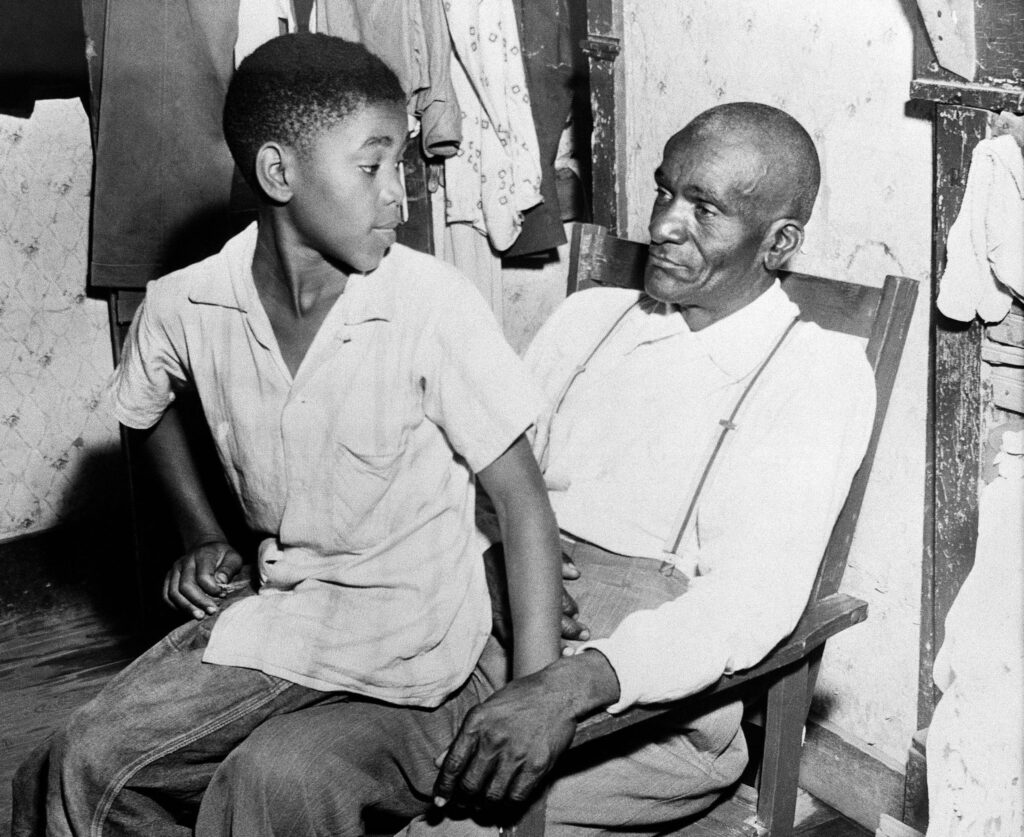
Simeon Wright, left, with his father, Moses, shortly after the murder of his cousin Emmett Till in 1955. – Credit – Associated Press

Emmett Till’s family at the trial of his accused murderers on Sept. 22, 1955. Front left is his grandfather, John Carthan, and his mother, Mamie Bradley. Moses Wright (in a light suit), his great uncle, would identify Roy Bryant and J.W. Milam, as the men who kidnapped his nephew. Also pictured is T.R.M. Howard
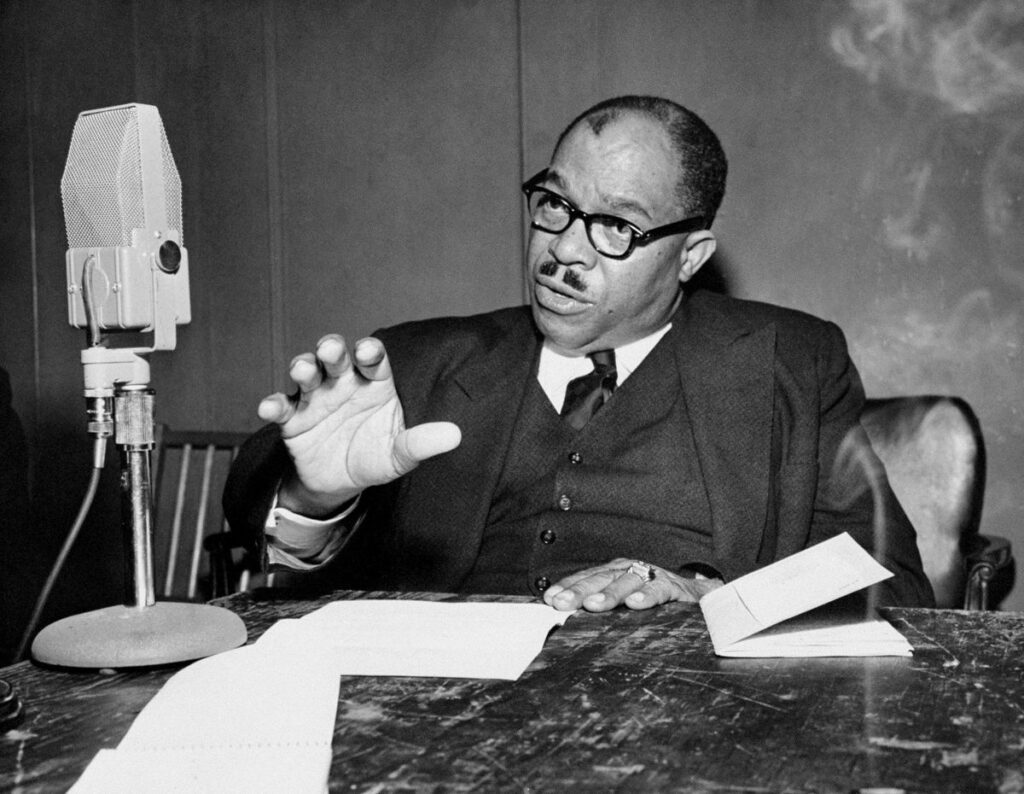
Theodore Roosevelt Mason Howard was a wealthy doctor, successful entrepreneur, and civil rights activist. Born and raised in Murray, Kentucky, Howard seemed destined to follow in his father’s footsteps as a tobacco twister until a white doctor at Murray’s local hospital recognized his ambitions of higher education. Dr. William Herbert Mason delivered Howard and had employed his mother as a cook for several years. Howard impressed Dr. Mason with his quick ability to learn, sharp intellect, and dreams of a college education. Dr. Mason gave Howard a chance when he was 15 years old by employing him in the local hospital where he thrived under a variety of jobs. It was there that he decided the medical field would be his future.
Howard first reached national prominence in 1955 when he became involved in the Emmett Till affair. Till was a black 14-year-old who, after supposedly flirting with a White woman, was murdered and then thrown into a river. Howard, who lived near the town where Till was killed, turned his home into a “black command center” for reporters, witnesses, and investigators searching for evidence. Although the two men charged with Till’s murder were acquitted, Howard continued to speak out for civil rights and relocated to Chicago after receiving death threats for his role in the Till case.
Understanding that no colored person had ever directly charged a White man in court, Wright still stood up in front of many angry white people on that day. “That was the first time in my life I was brave enough to charge a white man. That was not a brave act nor did I not fear. I just want justice”, he said. The next person to testify was Mrs. Till. With a surprisingly calm voice, she answered every question without any hesitation. To defend against people who did not believe the found body was Emmett Till, Mamie Till confirmed that the ring with “L.T” engraved on it was from Emmett Till’s father. As all the evidence against Milam and Bryant was proved, a twisted event happened.
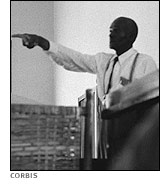
Moses Wright’s testimony in the trial of his great-nephew’s accused killers would go down in history as one of the bravest moments of the civil rights movement.
The Kidnapping | The Murder of Emmett Till | American Experience | PBS
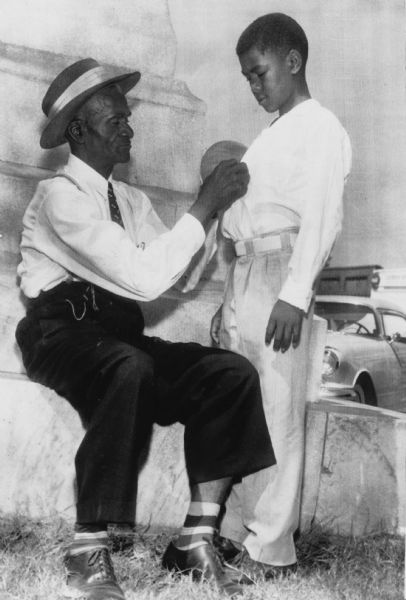
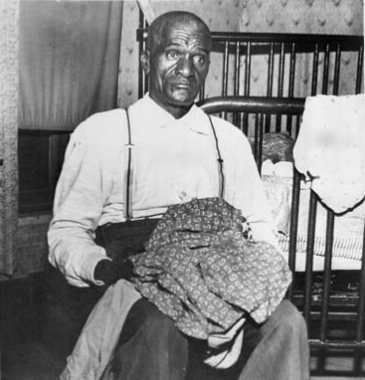
Moses Wright, holding clothing belonging to Emmett Till
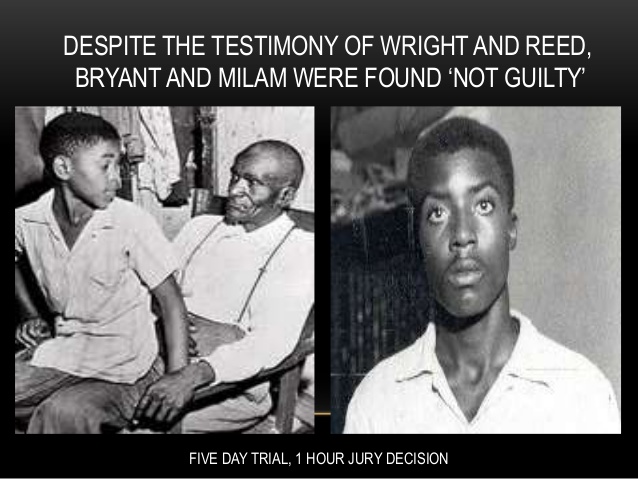
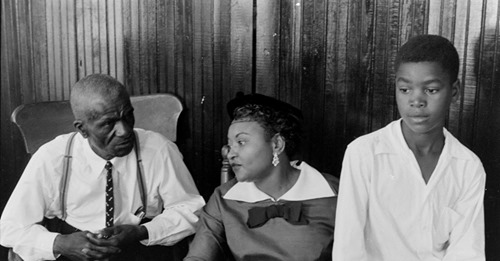
Willie Louis
Witness to the murder of 14-year-old Emmett Till
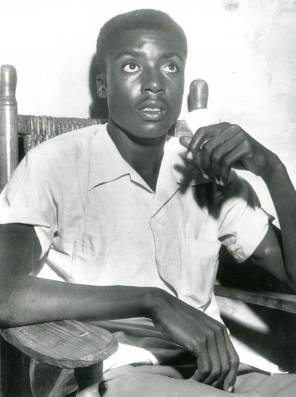
“Willie Louis (born Willie Reed; June 14, 1937 – July 18, 2013) was a witness to the murder of 14-year-old Emmett Till.[1] Till was an African-American child from Chicago who was murdered in 1955 after had reportedly whistled at a white woman in a Money, Mississippi, grocery store. Till’s murder was a watershed moment in the Civil Rights Movement. Louis testified in court about what he had seen, but an all-white jury found the men not guilty. Fearing for his life, Louis moved to Chicago after the trial and changed his name from Willie Reed to Willie Louis. He was interviewed in 2003 for the PBS documentary The Murder of Emmett Till and was interviewed the next year on the CBS News television program 60 Minutes. Willie Reed, as Willie Louis was then known, was born in 1937 in Greenwood, Mississippi, at the eastern edge of the Mississippi Delta. He was raised in Drew, Mississippi, by his grandparents who worked as sharecroppers. Reed received little formal education and worked in the cotton fields.” – Wikipedia
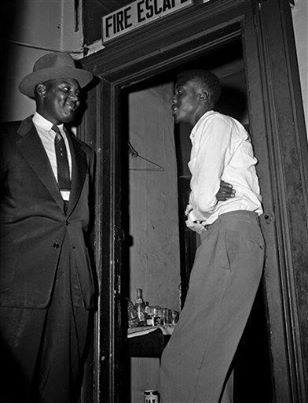
On the morning of Sunday, August 28, 1955, Reed, who was 18 years old, was walking on a dirt road near Drew, Mississippi, when he saw a green-and-white Chevrolet pick-up drive past him with four White men in the front and three African-American men and an African-American youth seated with his back to the cab. Reed recognized two of the men in the front seat as Roy Bryant, the husband of the woman at whom Till had reportedly whistled, and J.W. Milam, Bryant’s half-brother.
Reed saw the truck pull into a plantation owned by Milam’s brother and park in front of a barn. As he walked closer, he heard a boy inside the barn yelling, “Mama, save me!” He also heard the sounds of blows landing on a body and voices cursing and yelling, “Get down, you Black bastard.” Reed ran to the nearby house of Amanda Bradley and told her what he had seen and heard. Reed and another individual were sent to get water from a well near the barn. As they did so, they heard the continuing sound of the beating until the cries became fainter and then stopped.
As Reed walked back toward the Bradley house, Milam emerged from the barn with a pistol at his side. Milam confronted Reed and asked if he had seen or heard anything. Reed told Milam that he had not. Reed returned to the Bradley house and watched from a window as the men in the barn loaded what appeared to be a body into the pick-up truck
The decision to testify
On August 31, 1955, Till’s lynched body was discovered in the Tallahatchie River. The body showed signs that Till had been brutally beaten and shot in the head. Reed saw a photograph of Till in the newspaper and recognized him as the youth who he had seen hunkered down in the truck.[3] Bryant and Milam were arrested for the murder, but Reed’s grandfather warned Reed that he would be risking his safety if he spoke up. Reed was later approached by civil rights workers who persuaded him to testify in court. To ensure his safety, Reed went into hiding until the trial.
When Reed arrived at the courthouse to testify in the middle of September 1955, he was met by a “thicket of Klansmen massed outside the courthouse.”[3] Reed testified at the trial. He was shown a picture of Till and testified that it looked like the boy he had seen in the back of the truck. He also identified Milam and testified that he had seen Milam come out of the barn to get a drink of water and then return to the barn.[5] In his closing argument, the prosecutor reviewed Reed’s testimony and noted that if Willie had been lying, the defense would have had needed 50 lawyers to discredit him. The prosecutor argued being unable to do that “because Willie Reed was telling the truth.” He finished by saying, “I don’t know but what Willie Reed has more nerve than I have.”Despite Reed’s testimony and other evidence, Bryant and Milam were found not guilty after an hour of deliberation by the all-white jury.
Reaction to trial
In the aftermath of the trial, some suggested that Reed had not been a good witness and noted that he had given inconsistent accounts as to how far he was from Milam and whether he really recognized him. Even Till’s mother later said that “Little Willie Reed” was “not a good witness.” She added, “Willie Reed had a story, but he couldn’t tell it. It was locked inside him. It would have taken education to put the key in the lock and turn it loose. Every word that was gotten from Willie had to be pulled out word by word. That’s because Willie is 18 years old and has probably been to school only 3 years.”
Others had a more positive reaction to Reed’s testimony. The Jackson Daily News described his testimony as “the most damaging introduced thus far” and as having “electrified the court.”[8] The New York Times later wrote that Reed’s testimony “made him a hero” of the Civil Rights Movement.[3] The Daily Worker published an article titled “The Shame of Our Nation”, expressing outrage at the result but praising Reed and other witnesses as “heroes of the Negro people … who stood up in court and in defiance of a white supremacist code fearlessly gave their testimony.”
The historian David T. Beito said of Reed: “He was really the best eyewitness that they found…. his act in some sense was the bravest act of them all. He had nothing to gain: he had no family ties to Emmett Till; he didn’t know him. He was this 18-year-old kid who goes into this very hostile atmosphere.”
Later years
After testifying in the Till case, Reed moved to Chicago and changed his name from Willie Reed to Willie Louis. He was employed as an orderly at Woodlawn Hospital and later at Jackson Park Hospital. In 1976, he was married to Juliet Louis, who was a nursing aide at Jackson Park. Louis remained silent about his role in the Emmett Till case. His wife did not even learn of his connection to the case until 1984 and recalled that “he didn’t talk about it much.”
In 2003, Louis was located and interviewed by Stanley Nelson, who later wrote a book and produced a documentary on the case. Nelson’s documentary, The Murder of Emmett Till, was broadcast on PBS television in the United States and included an interview with Louis. Nelson later said:
Willie Reed stood up, and with incredible bravery pointed out the people who had taken and murdered Emmett Till. He was from Mississippi, and somewhere in his heart of hearts, he had to know that these people would not be convicted. But he did what he had to do.
Thereafter, Louis met Till’s mother and began speaking in public about the case. In 2004, he was interviewed on the CBS News television show 60 Minutes. During the interview on 60 Minutes, Louis explained his reasoning for deciding to testify: “I couldn’t have walked away from that. Emmett was 14, probably had never been to Mississippi in his life, and he come to visit his grandfather and they killed him. I mean, that’s not right.”
In July 2013, Louis died of intestinal bleeding at age 76 in Oak Lawn, Illinois.
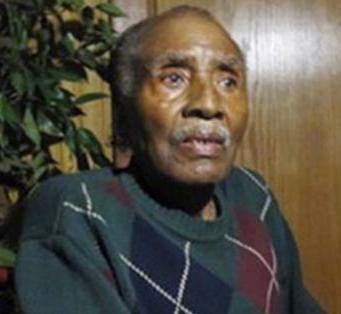
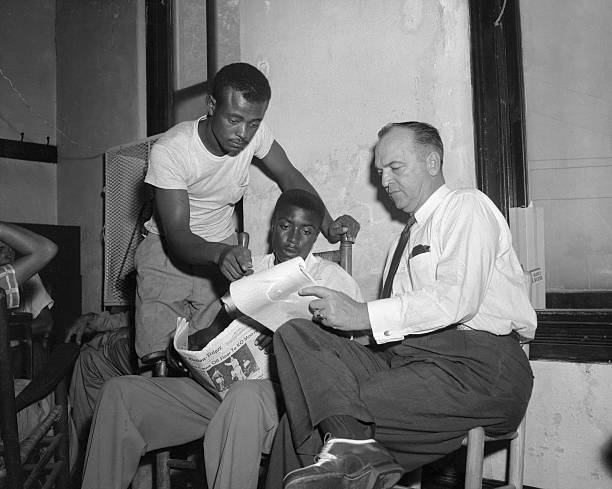
(Original Caption) New Witnesses Questioned by D.A. in “Wolf-Whistle” Trial. Sumner, Mississippi: District Attorney Gerald Chatham, right, talks to two new witnesses for the state in the “wolf-whistle” murder trial. They are Walter Billingsley, left, and Willie Reed. Mrs. Mamie Bradley, mother of Emmett Louis Till, the 14-year-old Chicago Negro boy who was murdered, took the stand today and identified a police picture of the body. The two men on trial for the murder, Roy Bryant and J.W. Milam sat just back of the defense counsel table less than 15 feet from the bereaved mother.

Witnesses to the kidnapping and beating of Emmett Till.
L to r: Amanda Bradley, Willie Reed, and Walter Reed, plantation workers from Sunflower County, Miss.
“He was with Emmett Till the night he was murdered. The horror haunts him still.”
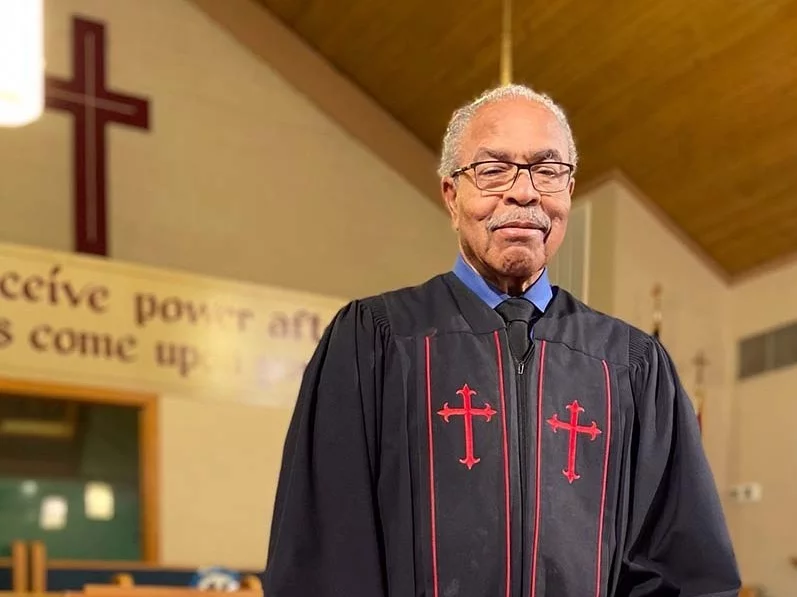
Dr. Marvel Parker
The Rev. Wheeler Parker Jr. is the last living witness of the kidnapping of Emmet Till. Nearly 70 years later, he will still break down in tears when he describes what happened.
Parker never talked to Mamie about what happened to her son.
“She never asked me what happened,” he said. “I always had survivor’s guilt. You know, how did she feel about me being here? Her son didn’t come back. So we never discussed it at all. She just recognized that I was the one with her son. I came back, and her son didn’t.”
But, years later she would ask Parker to carry on his legacy.
“The KKK Threatened Death To Civil Rights Activists
Dr. T.R.M. Howard got involved in the case, hiring bodyguards to protect the Black witnesses and Mamie Till during the trial. He also helped the witnesses escape from town after they testified. After the acquittal of Emmett Till’s murderers, Howard openly spoke out against the FBI:
It’s getting to be a strange thing that the FBI can never seem to work out who is responsible for the killings of Negroes in the South.
By December 1955, Howard was on the Ku Klux Klan death list, which forced him to move away from Mississippi.”
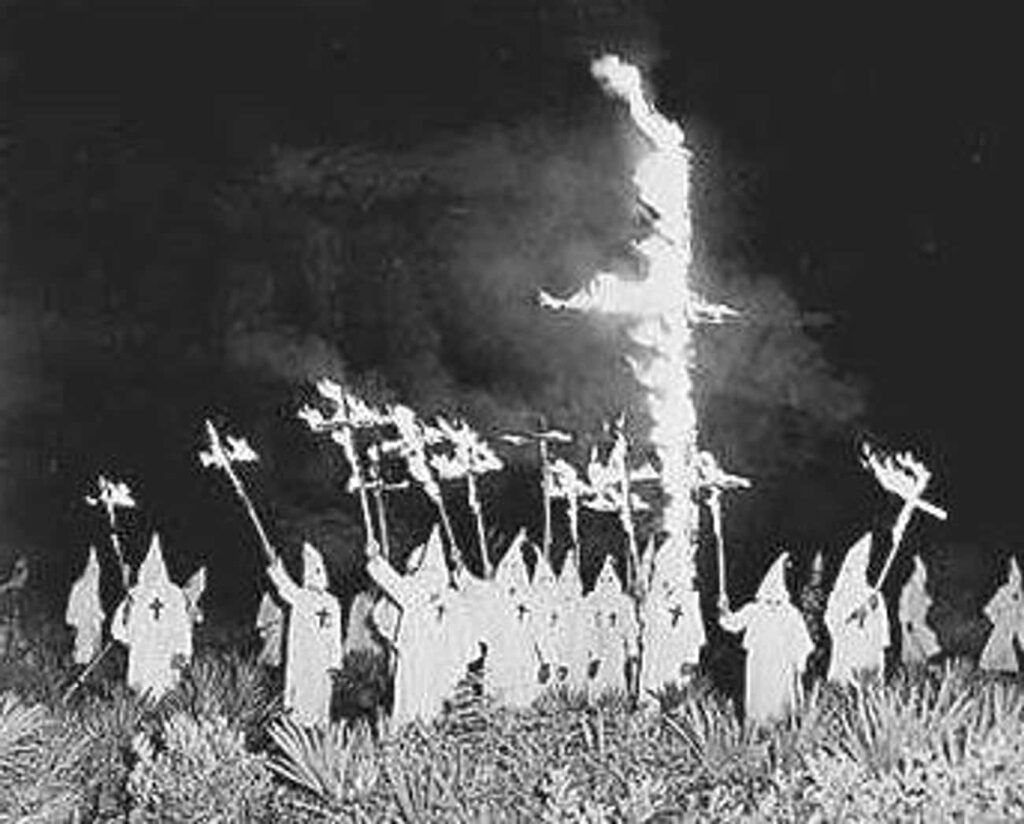
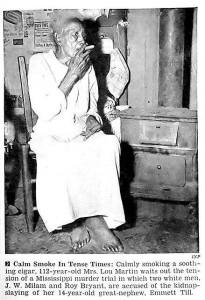
112 Yr Old Mississippi Woman Waits for Word on Emmett Till Murder Trial – Jet Magazine, October 6, 1955
An Overlooked Witness to Emmett Till’s Kidnapping

@ ALL RIGHTS RESERVED – Iforcolor.org/Dale Shields
NO COPYRIGHT INFRINGEMENT INTENDED

